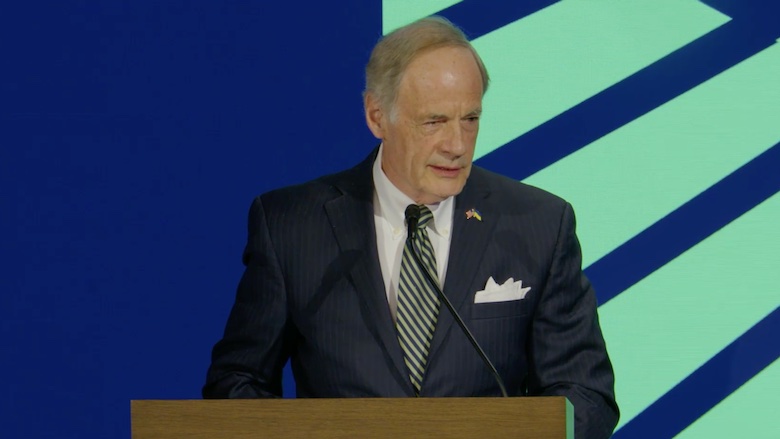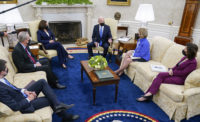As the U.S. Senate gets ready for hearings on possible legislation to speed up federal review and permitting for construction projects, a coalition of industry and other business groups is pushing the case for bipartisan legislation to meet that goal.
Industry officials and some key senators aired the issues surrounding permitting reform at an April 18 meeting at the U.S. Chamber of Commerce, which led the formation of the large coalition pushing to see Congress clear permitting legislation by the end of summer.
Neil Bradley, the group’s executive vice president, recalled the success a similar coalition had in advocating for what became the 2021 Infrastructure Investment and Jobs Act. “Our goal this year is simple–to repeat that formula to get permitting reform across the finish line and enacted into law,” he said.
Some critics would like to see changes in the National Environmental Policy Act. But a major rewrite of NEPA seems unlikely, given the strong support for the statute voiced by Senate Environment and Public Works Committee Chair Tom Carper (D-Del.).
The House has already laid down its marker on permitting, with the March 30 passage of wide-ranging energy legislation that includes a set of provisions seeking to accelerate federal project reviews. Among the changes is limiting the time for NEPA environmental impact reviews to two years and the length to 150 pages. Such reviews apply to large projects.
Focus on the Senate
Attention on permitting has shifted to the Senate, where two key committees–Environment and Public Works and Energy and Natural Resources—plan hearings on the topic soon. EPW's hearings could begin as soon as the last week of April, leaders of those panels told meeting attendees.
Sen. Shelley Moore Capito (W.Va.), EPW's top Republican, said the plan that she and GOP colleagues are working on has several main elements, including "enforceable deadlines" and specified time limits for the various stages of review; and limiting the time for bringing court challenges of a project approval to 60 days.
“The agencies just keep passing the buck, elongating, elongating, delay, delay,” she said.
Regarding a possible legislative vehicle, Capito noted House Speaker Kevin McCarthy's April 17 speech proposing a one-year extension of the U.S. debt limit but tied to spending caps and other elements including the House-passed energy bill.
Linking the entire House energy measure to a debt-limit extension is probably too big a “bite of the apple,” Capito said. But she suggested limiting it to just the House bill’s permit section might be more palatable to some legislators.
Still, the White House has insisted that Congress deal with a debt limit extension as a stand-alone measure.
The IIJA did include several provisions to address expediting federal permitting review for transportation projects, particularly highways and bridges. Some construction industry officials contend, however, that the Biden administration has not moved as fast or as far as it should in implementing those provisions.
But the main focus of the current permitting discussions is on energy projects, including pipelines and electric power lines.
Manchin Seeks Faster Reviews
Energy and Natural Resources Chairman Joe Manchin (D-W.Va.) has long had a keen interest in revamping project reviews, especially in the energy sector. Last year, he introduced a bill to revise the approval process for energy projects, but his attempt in December to link it to the defense authorization bill failed in the Senate.
He told the U.S. Chamber of Commerce gathering that Congress needs to produce “a permitting bill that works." He also said that "NEPA needs to be reformed."
Manchin added that in seeking permitting reform, "We’re not trying to circumvent anything. We were trying to accelerate everything.”
Referring to federal agencies, Manchin said, "If you can’t do your job in time, then get out of the way and we’re going to move on.”
Sen. Carper said, "There’s more we can do in order to improve our nation’s environmental review procedures and support the deployment of clean energy."
But Carper is a strong supporter of NEPA. "While there are always opportunities to improve our environmental protection [measures], they’re there for a reason," he said, adding, "and we have to be careful not to throw out the baby with the bathwater.”
NEPA “helps the federal government make sound decisions" [and] also gives communities, especially those impacted by infrastructure projects, an opportunity to make sure their voices are heard," Carper said.
Thomas W. Smith III, American Society of Civil Engineers executive director, said projects can be expedited. He cited the example of the team that built a replacement for Pittsburgh's collapsed Fern Hollow Bridge in less than a year.
”It can be done,” Smith said. “We’ve shown how it can be done. We just have to have that level of urgency in everything that we do.”





